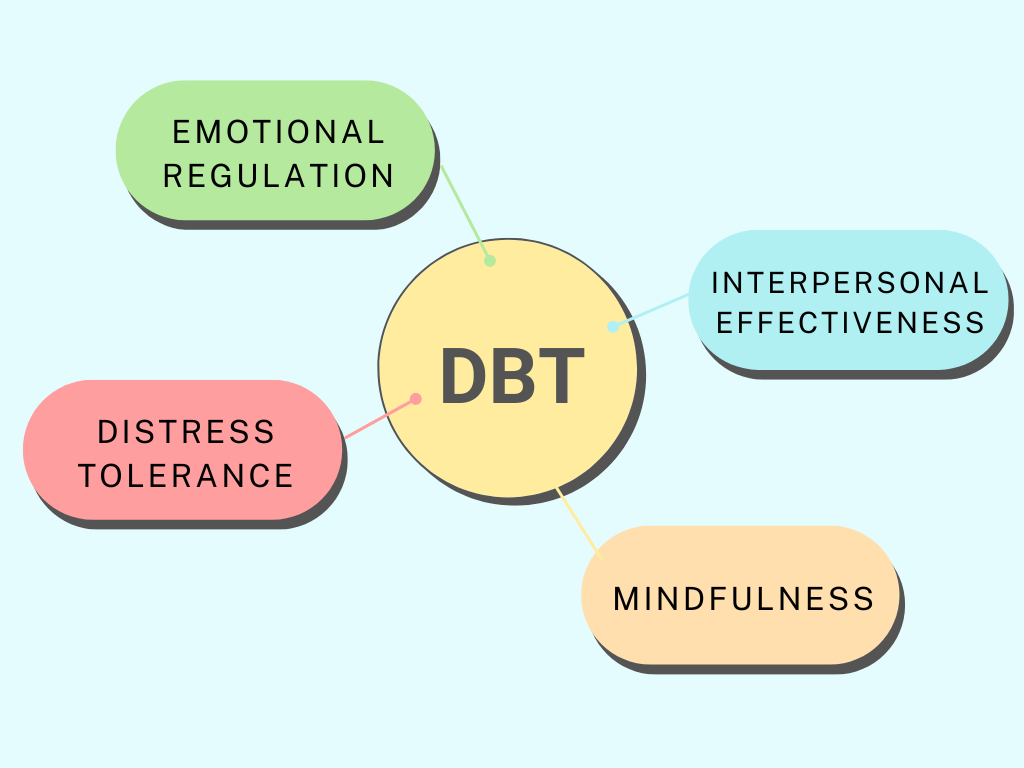DBT London: Where Hope and Recovery Intersect for Lasting Change
DBT London: Where Hope and Recovery Intersect for Lasting Change
Blog Article
Encouraging Individuals Via Effective Dialectical Practices Treatment (DBT) Solutions: Building Stronger Mental Health Foundations
In the realm of mental health and wellness and wellness, the significance of encouraging individuals through efficient Dialectical Behavior Treatment (DBT) services can not be overemphasized. By focusing on the core concepts of DBT, such as improving psychological guideline abilities, enhancing social effectiveness, constructing distress tolerance techniques, and growing mindfulness practices, individuals can embark on a trip in the direction of structure more powerful mental health foundations. The impact of DBT surpasses mere symptom management; it uses an alternative method that equips individuals with the devices required to browse life's obstacles with resilience and self-awareness. As we discover the transformative potential of DBT in encouraging people to lead even more satisfying lives, the course to boosted mental health and wellness and well-being ends up being an engaging narrative that beckons expedition.
Recognizing the Core Concepts of DBT
.jpg)

One core concept of DBT is recognition. Another essential element is dialectics, which shows individuals to watch circumstances from multiple perspectives and find the synthesis in between conflicting ideas or emotions.
Furthermore, the concept of dialectical abstaining is central to DBT. This principle urges individuals to avoid self-destructive habits while likewise approving themselves. By recognizing and integrating these core principles, specialists can properly carry out DBT methods and support individuals in their journey in the direction of psychological regulation and psychological well-being.
Enhancing Psychological Regulation Abilities
Developing efficiency in taking care of feelings is an essential facet of fostering psychological well-being and interpersonal effectiveness - DBT London. Enhancing psychological policy skills is a core part of Dialectical Practices Therapy (DBT) that gears up people with the devices to navigate intense emotions in a constructive and healthy manner. Via DBT, people find out to recognize, understand, and regulate their feelings, leading to boosted psychological health results
DBT emphasizes the value of mindfulness, which includes being existing in the moment without judgment. This method permits people to observe their emotions without becoming overwhelmed by them, boosting their ability to respond efficiently instead of respond impulsively. By growing mindfulness, people can create a greater feeling of self-awareness and psychological control.
In addition, DBT shows sensible abilities such as distress resistance and feeling guideline techniques to help individuals handle difficult emotions. By learning these skills, people can minimize impulsive habits, improve decision-making, and enhance their relationships with others. Eventually, boosting emotional law skills with DBT encourages individuals to lead more fulfilling and well balanced lives.

Improving Interpersonal Efficiency
Having established a strong foundation in emotional policy abilities within the framework of Dialectical Behaviour Therapy (DBT), the emphasis now moves in the direction of boosting social performance. Improving social effectiveness is an essential part of DBT as it equips individuals with the necessary abilities to browse social communications, interact properly, set boundaries, and develop much Learn More healthier partnerships.
In DBT, social performance skills are shown via modules that concentrate on areas such as assertiveness, reliable interaction, and social problem-solving. By learning these skills, people can boost their ability to reveal their needs and needs, preserve self-esteem, and build stronger links with others.
Practicing mindfulness is an integral part of enhancing social performance within the DBT framework. Mindfulness enables individuals to be present in their interactions, listen actively, and respond thoughtfully as opposed to respond impulsively. By incorporating mindfulness into their lives, individuals can cultivate greater self-awareness and emotional guideline, which are vital for effective interpersonal interactions.
Structure Distress Tolerance Techniques
Exploring reliable methods for taking care of psychological distress is important for people looking for to boost their coping abilities and durability. Structure distress resistance strategies is a crucial facet of Dialectical Behavior Treatment (DBT) that encourages people Get the facts to browse difficult feelings without coming to be overloaded.
Additionally, mindfulness practices play a significant duty in structure distress resistance. Mindfulness motivates individuals to stay existing in the moment without judgment, permitting them to observe their ideas and feelings without responding impulsively. This awareness enables people to tolerate distress much more efficiently and establish a higher sense of control over their actions.
Along with these strategies, creating a customized distress tolerance plan with the support of an experienced therapist can provide individuals with a tailored method to managing emotional distress - DBT London. By including these approaches right into every day life, people can strengthen their mental wellness foundations and enhance their general well-being

Cultivating Mindfulness Practices
To deepen their distress tolerance techniques better, people can concentrate on cultivating mindfulness methods as a complementary technique within the framework of Dialectical Practices Treatment (DBT) Mindfulness, a vital element of DBT, includes taking notice of the existing moment without judgment. By promoting mindfulness, people can improve their recognition of ideas, feelings, and physical experiences, promoting a much deeper understanding of themselves and their experiences.
Mindfulness techniques in DBT consist of techniques such as mindful breathing, body scans, and observing thoughts without attachment. These methods urge people to create a non-reactive stance in the direction of their internal experiences, permitting them to reply to tough situations with better clarity and composure. By integrating mindfulness into everyday routines, people can find out to regulate their emotions better, reduce impulsive habits, and grow a feeling of inner tranquility.
Through growing mindfulness techniques, people undertaking DBT can develop a solid foundation for taking care of stress and anxiety, boosting connections, and improving total well-being. By integrating mindfulness into their restorative trip, individuals can create important skills that equip them to navigate life's challenges with durability and self-awareness.
Final Thought
To conclude, effective Dialectical Behaviour look at here now Therapy (DBT) services play an important function in empowering people to build more powerful mental health and wellness structures. By recognizing the core concepts of DBT, improving psychological policy skills, improving interpersonal effectiveness, constructing distress resistance techniques, and cultivating mindfulness methods, individuals are geared up with the required devices to browse their emotions, connections, and obstacles in a more resistant and adaptive manner. DBT services offer an extensive approach to promoting psychological well-being and equipping people to lead satisfying lives.
By focusing on the core principles of DBT, such as boosting emotional guideline abilities, improving social effectiveness, building distress tolerance methods, and cultivating mindfulness methods, people can embark on a trip towards building more powerful psychological health foundations. Enhancing psychological guideline skills is a core component of Dialectical Behaviour Treatment (DBT) that gears up individuals with the tools to navigate extreme feelings in a healthy and balanced and constructive fashion.Moreover, DBT instructs useful abilities such as distress resistance and feeling guideline strategies to aid people handle challenging feelings.To strengthen their distress tolerance strategies even more, people can focus on growing mindfulness techniques as a complementary approach within the framework of Dialectical Behavior Treatment (DBT) By recognizing the core concepts of DBT, boosting psychological law skills, enhancing interpersonal effectiveness, building distress resistance strategies, and growing mindfulness methods, people are equipped with the essential devices to navigate their emotions, partnerships, and obstacles in a much more resilient and flexible manner.
Report this page